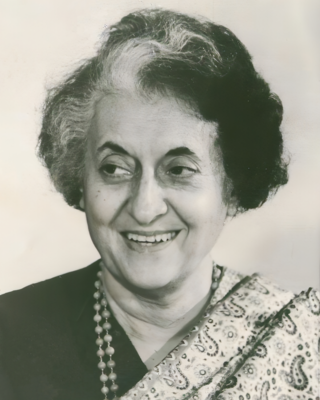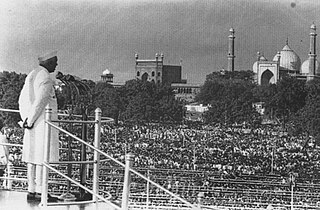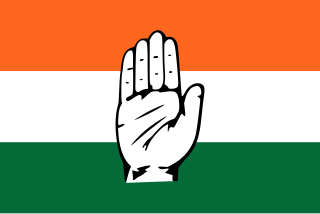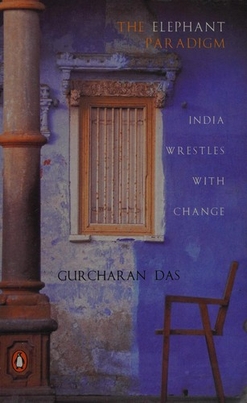
Indira Priyadarshini Gandhi was an Indian politician and stateswoman who served as the 3rd prime minister of India from 1966 to 1977 and again from 1980 until her assassination in 1984. She was India's first and, to date, only female prime minister, and a central figure in Indian politics as the leader of the Indian National Congress (INC). She was the daughter of Jawaharlal Nehru, the first prime minister of India, and the mother of Rajiv Gandhi, who succeeded her in office as the country's sixth prime minister. Gandhi's cumulative tenure of 15 years and 350 days makes her the second-longest-serving Indian prime minister after her father. Henry Kissinger described her as an "Iron Lady", a nickname that became associated with her tough personality.

Jawaharlal Nehru was an Indian anti-colonial nationalist, secular humanist, social democrat, author and statesman who was a central figure in India during the middle of the 20th century. Nehru was a principal leader of the Indian nationalist movement in the 1930s and 1940s. Upon India's independence in 1947, he served as the country's first prime minister for 16 years. Nehru promoted parliamentary democracy, secularism, and science and technology during the 1950s, powerfully influencing India's arc as a modern nation. In international affairs, he steered India clear of the two blocs of the Cold War. A well-regarded author, the books he wrote in prison, such as Letters from a Father to His Daughter (1929), An Autobiography (1936) and The Discovery of India (1946), have been read and deliberated upon around the world.

The Indian National Congress (INC), colloquially the Congress Party or simply the Congress, is a political party in India with deep roots in most regions of India. Founded on 28 December 1885, it was the first modern nationalist movement to emerge in the British Empire in Asia and Africa. From the late 19th century, and especially after 1920, under the leadership of Mahatma Gandhi, the Congress became the principal leader of the Indian independence movement. The Congress led India to independence from the United Kingdom, and significantly influenced other anti-colonial nationalist movements in the British Empire.

Jayaprakash Narayan Srivastava, also known as JP and Lok Nayak, was an Indian independence activist, theorist, socialist and political leader. He is mainly remembered for leading the mid-1970s opposition against Prime Minister Indira Gandhi and calling for her overthrow in a "total revolution". In 1999, Narayan was posthumously awarded the Bharat Ratna, India's highest civilian award, in recognition of his social service. His other awards include the Magsaysay award for public service in 1965.

Morarji Ranchhodji Desai was an Indian independence activist and politician who served as the Prime Minister of India between 1977 and 1979 leading the government formed by the Janata Party. During his long career in politics, he held many important posts in government such as Chief Minister of Bombay State, Home Minister, Finance Minister and 2nd Deputy Prime Minister of India.

Chaudhary Charan Singh, better known as Charan Singh was an Indian politician and a freedom fighter. Singh was principally known for his land and agricultural reform initiatives. He briefly served as the prime minister of India from July 1979 to August 1979 and was Member of Parliament (MP) for Baghpat. During prime ministership he was a member of the Janata Party (Secular). He served as 5th Chief Minister of Uttar Pradesh as a member of Bhartiya Kranti Dal. He also briefly served as deputy prime minister of India from January 1979 to July 1979 as a member of the Janata Party. Singh is widely regarded as the "Champion of farmers", after his life has been dedicated to advocating for the wellbeing and rights of farmers.

The Janata Party is an unrecognized political party in India. It was founded as an amalgam of Indian political parties opposed to the Emergency that was imposed between 1975 and 1977 by Prime Minister Indira Gandhi of the Indian National Congress. In the 1977 general election, the party defeated the Congress and Janata leader Morarji Desai became the first non-Congress prime minister in independent modern India's history.

The non-cooperation movement was a political campaign launched on January 4, 1921 by Mahatma Gandhi to have Indians revoke their cooperation from the British government, with the aim of persuading them to grant self-governance.

The Swatantra Party was an Indian classical liberal political party that existed from 1959 to 1974. It was founded by C. Rajagopalachari in reaction to what he felt was the Jawaharlal Nehru-dominated Indian National Congress's increasingly socialist and statist outlook.
The Licence Raj or Permit Raj is a pejorative for the system of strict government control and regulation of the Indian economy that was in place from the 1950s to the early 1990s. Under this system, businesses in India were required to obtain licences from the government in order to operate, and these licences were often difficult to obtain.

The history of independent India or history of Republic of India began when the country became an independent sovereign state within the British Commonwealth on 15 August 1947. Direct administration by the British, which began in 1858, affected a political and economic unification of the subcontinent. When British rule came to an end in 1947, the subcontinent was partitioned along religious lines into two separate countries—India, with a majority of Hindus, and Pakistan, with a majority of Muslims. Concurrently the Muslim-majority northwest and east of British India was separated into the Dominion of Pakistan, by the Partition of India. The partition led to a population transfer of more than 10 million people between India and Pakistan and the death of about one million people. Indian National Congress leader Jawaharlal Nehru became the first Prime Minister of India, but the leader most associated with the independence struggle, Mahatma Gandhi, accepted no office. The constitution adopted in 1950 made India a democratic republic with Westminster style parliamentary system of government, both at federal and state level respectively. The democracy has been sustained since then. India's sustained democratic freedoms are unique among the world's newly independent states.

The term "Hindu rate of growth" was coined by the Indian economist Raj Krishna in 1978. It refers to the annual growth rate of India's economy before the economic reforms of 1991, which averaged 4% from the 1950s to the 1980s. Advocates of liberalisation often use this term. However, modern neoliberal economists criticise the term, as they believe that the low growth rate was caused by the failed five-year plan model and economic mismanagement. Many economists worldwide characterise the economic system after the 1990s as Dirigisme. Dirigiste policies often include indicative planning, state-directed investment, and the use of market instruments to incentivize market entities to fulfill state economic objectives.Eighth Five Year Plan was for managing the transition from a centrally planned economy to market led economy through indicative planning.

Jivatram Bhagwandas Kripalani, popularly known as Acharya Kripalani, was an Indian politician, noted particularly for holding the presidency of the Indian National Congress during the transfer of power in 1947 and the husband of Sucheta Kripalani. Kripalani was an environmentalist, mystic and independence activist who was long a Gandhian socialist, before joining the economically right wing Swatantra Party later in life.

The Indian National Congress was established when 72 representatives from all over the country met at Bombay in 1885. Prominent delegates included Dadabhai Naoroji, Surendranath Banerjee, Badruddin Tyabji, Pherozeshah Mehta, W. C. Banerjee, S. Ramaswami Mudaliar, S. Subramania Iyer, and Romesh Chunder Dutt. The Englishman Allan Octavian Hume, a former British civil servant, was one of the founding members of the Indian National Congress.

Raj Narain was an Indian freedom fighter and politician. He won in a famous electoral malpractice case against the then Prime Minister Indira Gandhi, which led to her disqualification and imposition of Emergency in India in 1975. He defeated Indira Gandhi during the 1977 Lok Sabha elections.

The Nehru–Gandhi family is an Indian political family that has occupied a prominent place in the politics of India. The involvement of the family has traditionally revolved around the Indian National Congress, as various members have traditionally led the party. Three members of the family—Jawaharlal Nehru, Indira Gandhi and Rajiv Gandhi—have served as the prime minister of India, while several others have been members of parliament (MP).
The Mumbai Consensus is a term used to refer to India's model of economic development, with a "people-centric" approach for managing its economy which may be taken up by other developing nations in time. The Indian model of economic growth, which relies on its domestic market more than exports, boosted domestic consumption rather than investment, pursued service-oriented industries rather than low-skilled manufacturing industries, and has greatly differed from the typical Asian strategy of exporting labor-intensive, low-priced manufactured goods to the West. This model of economic development remains distinct from the Beijing Consensus with an export-led growth economy, and the Washington Consensus focused instead on encouraging the spread of democracy and free trade.

Gurcharan Das is an Indian author who wrote a trilogy based on the classical Indian goals of the ideal life.

The Elephant Paradigm: India Wrestles with Change is a collection of essays written by journalist and economist Gurcharan Das. In this book, Das covers a larger area looking at how India is wrestling with change. This book is a sequel of India Unbound.
The economic policy of the Indira Gandhi premiership was characterized by moderate tax increases on higher income Indians, bank nationalisation, and the green revolution. Gandhi presided over three Five-Year Plans as Prime Minister, two of which succeeded in meeting the targeted growth.

















